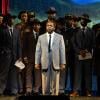
Coloratura soprano Erin Morley has performed at the Metropolitan Opera more than 100 times, including as Pamina in The Magic Flute, as Olympia in The Tales of Hoffmann, and in the title role of Matthew Aucoin’s Eurydice.
Now, Morley, who studied at the Eastman School of Music and The Juilliard School, will appear at Cal Performances for the first time. Her Feb. 18 recital in Hertz Hall with pianist Malcolm Martineau consists of songs about gardens — full of birds, flowers, and dragonflies. It’s similar territory to her forthcoming solo album, which will be released in April.
Morley, who recently made her debut at the Royal Opera House as Gilda in Rigoletto, has won several major accolades, including the Met’s Beverly Sills Award, the Opera News Award, and, as she mentions in this interview (right before having received it), a Knight in the Order of Arts and Letters from the French Ministry of Culture. She also discusses how playing the piano prepared her to be a singer, why she likes eye contact with the audience, and what her long relationship with the Met has meant.

You played piano and violin growing up. When did you start to study singing, and what do you love about it?
I started studying when I was 16. There is an element of language and storytelling that you don’t have when you’re a pianist. There is also that eye-to-eye contact with the audience. I think I was well prepared for a career in singing by studying piano and violin, and it really does so much for my musicianship. My first voice teacher really built upon those skills. My piano teacher, likewise, would talk a lot about singing in our lessons. She would draw lots of inspiration from the human voice. She would say, “This melody, this is a singer here. Play this as if you’re singing it.”
I was studying voice at the same time as piano for a few years, so there was an overlap. [And as musicians] we really try to draw inspiration from each instrument, and it was fascinating and very helpful.
Do you find that your approach to singing has changed over the years?
I think, in the beginning, it took a while for me to transition to the idea of looking at my audience. I was fascinated by that, and I loved that. I always had loved musical theater as a child, but I didn’t know how to do it. So, the acting aspect of singing has built slowly over time. That’s been a fascinating challenge. It’s a continuous learning process.
As opera singers, we have to study so many different languages, and I absolutely love languages. Diving deep into these languages grabbed my intellectual side but also grabbed my heart because you learn about the poetry of different countries and different customs and different things that matter to different people. It teaches you about the world. I think there’s something beautiful about celebrating all those different cultures, and in my program at Berkeley, I’m including five different languages. We’re going to be presenting in English, French, German, Russian, and Italian.
Is there any language you particularly enjoy singing in?
I love all languages. I have sung a lot of German in opera, and I’ve also worked the most in German-speaking countries. French is also really strong for me — I’ve actually probably sung just as much in France as in German-speaking countries, and getting to know that language well, I think, opened up other doors for me professionally and artistically. There’s something so beautiful about the sound of the French language that works very well in singing.
I will be receiving a nice award from the Ministry of Culture in France. They’re giving me the equivalent of their knighthood, which is a huge honor. I have done a bunch of French recordings of operas, and some are not so famous, and I think they would like to see more people exposed to them. It is a language and a culture that I absolutely love.
Then, you cannot deny that Italian is a beautiful language to sing in. I’m glad that we have one Italian song on the program. And of course, Russian is like a very sort of back and swallowed language. But it is really beautiful for singing, and my Russian training has been some of the most satisfying for me. I’ve loved working with my Russian coaches and teachers, and I love the Russian song repertoire. Of course, I love the operas and the ballets, but the song repertoire is really rich, and it always gives the pianist something really interesting to play. I have a wonderful pianist on this program. Malcolm Martineau is really the best of the best.
How did you choose what to sing at Cal Performances?
All of the songs are garden-themed. Everything is either about birds or flowers or a dragonfly or a butterfly. That’s inspired by an album I have coming out in April. It’s not the exact program from my album, but it’s a lot of overlap.

Basically, this album came about because of a song cycle by Ricky Ian Gordon, which is a commission from a friend of mine. She commissioned Ricky to write songs about flowers, and he put together this just fantastic collection of poems. He wrote eight songs about flowers, and they’re gorgeous. We’re doing four of those to start the program, and at The Kennedy Center in May, I will be performing the whole cycle. This is like a teaser for Ricky’s new cycle.
I was inspired by that to just build an entire program about birds and flowers and gardens. There’s so much to be learned from nature, and that’s why, I think, there’s so much poetry inspired by nature. The program is kind of like a stroll through a garden, and it explores all aspects of gardens. It’s about the brutality of nature and the cycles of nature, like death and resurrection, and it’s about losing somebody. There’s a lot of humor in it, too. It’s about getting roses from an admirer and wanting something more.
Then, there are all these songs about birds. There are all kinds of birds on the program. Like, there are lots of nightingale songs out there, especially for the coloratura voice, which just lends itself to songs about birds. I love these bird songs — there are birds who annoy you, there are birds who are lovesick and trying to attract the attention of the rose. There’s the bird who inspires the rose to bloom. It’s a really nice collection of songs about gardens, and we put a lot of heart into the programming, so I hope people love it. It’s special.
This is your first time at Cal Performances. What is exciting about debuting here?
I have admired their programming for a long time, and I really love Jeremy Geffen and all of the work that he does with Cal Performances [as executive and artistic director]. I think he’s just an incredible artistic human being and understands artists and does such creative programming. I think it’s a great series, so I have been really looking forward to it. I’m also looking forward to being in California. I work so much in Europe that I don’t get to the West Coast too much. I grew up in Utah, and going back to the West always feels like going home.
Could you talk about your relationship with the Met and how you started with the company?
I did the training program, the Lindemann Young Artist Development Program, and I was there for three years, straight out of Juilliard. It was a bridge between student life and professional life, and I’ve maintained a nice relationship with the company. I love the Met. They gave me so many opportunities. A lot of my role debuts happened at the Met, which seems kind of crazy. I did my first Olympia there. I did my first Sophie in Der Rosenkavalier there.
And all of the roles that I do now are things that I worked on during those three years, like Gilda, and I just really enjoyed my time [in the program]. We were exposed to so much, and we were given a million ways to learn, and I just ate it up. It was a very, very demanding program, and you really come out of something like that knowing what you want. In order to come into your own, you have to take all of these voices that you’ve been exposed to and decide who you want to be. It forces you to really tap into who you are as an artist, so I really am grateful for that time.

It seems like Eurydice at the Met in 2021 was a milestone performance for you.
It really does feel that way. It was certainly a lot of trust the Met put in me to give me a project like that. I remember when [General Manager] Peter Gelb first called me to talk about that project. I was about to give birth to my third child. He said, “I want you to just look at the score.” I had been kind of resistant, and I think part of that was because I feel like a lot of modern music is too dark. I don’t feel like we have a nice balance. There’s not enough humor. There’s not enough light. A lot of it is dark and dreary and tortured. So, I said, “I really am going to have to see if I connect with the music because a lot of this is too dark for me.”
And I looked at it, and I absolutely fell in love with it. It is just this beautiful opera. Of course, there’s a lot of darkness in it, but there’s also a lot of light, and there are redeeming themes. I was quite moved by this piece. That’s what made me decide to take on the project — because it was a mammoth undertaking. Matthew Aucoin is a really special talent, and working with him was incredible. He writes very complicated music, so it was a time-consuming affair, for sure. But it was so rewarding. The libretto that Sarah Ruhl, the playwright, wrote is just so interesting and so rich. There are feminist moments there where we’re finally hearing the story of Eurydice rather than just Orpheus. But it’s so much more. It’s about her relationship to her father and the relationship between the artist and their significant other and how that dynamic works.
I watched Maestro recently, the new Leonard Bernstein film. I was thinking about Eurydice when I was watching that because it’s a lot about the relationship between Felicia [Montealegre] and Leonard and how those difficulties come into artists’ relationships. Eurydice touched on those themes a lot. The characters are really rich. She goes to hell and back. She dies like three times within the show, and that’s a hard thing to play. When she arrives in the underworld, she loses her memory, so the character was really rich. The music was beautiful. It was complicated, and it was interesting, but it was also singable. I will always treasure that as one of my biggest moments at the Met.




